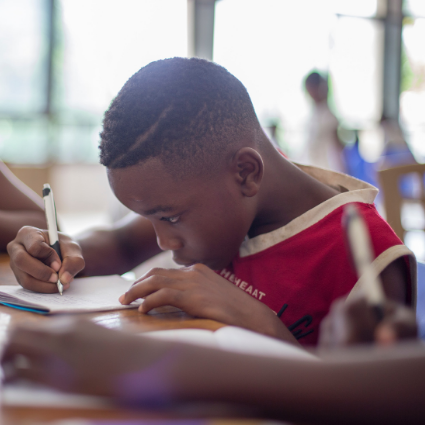Brain Blast | The Power of Play
The latest news on the brain and beyond.
Ever wonder what’s going on inside your child’s mind? Read this issue of the Brain Blast to get a glimpse into how and why young brains function, develop, and struggle in unique ways.
Cursive primes the brain for learning
In many schools, cursive handwriting is on the way out. Students’ brains could suffer as a result. A research team studied children’s EEGs as they wrote in cursive or typed. When the children wrote in cursive, their brains demonstrated more activity in the parietal lobe and their theta brainwaves became more synchronized. Activity in these brain regions is associated with improved memory and learning.
Story via Psychology Today
Brain data used to predict weight challenges
Yale researchers set out to study the nucleus accumbens, a region of the brain linked to motivation and eating habits. They observed that the higher the density of cells in the nucleus accumbens, the more likely a child’s body mass index was to increase within the next year. The team suggests that inflammation in this brain area can be triggered by overeating and can, in turn, encourage more overeating.
Story via Yale University
Music linked to better memory in children
According to Chilean researchers, music may encourage brain development in children. They assessed the working memory skills of two groups of children. Through fMRIs, they discovered that children who played a musical instrument and regularly took music lessons had greater activation in the brain regions associated with recall and attention than children who had never played an instrument.
Story via Frontiers in Neuroscience
Brain degeneration associated with pollution
Neurological damage may be linked to air pollution. A research team noticed nanoparticles from vehicle pollution in the brainstems of children and young adults who had been exposed to high levels of air pollution. These young people also had markers for Alzheimer’s and Parkinson’s disease in their brainstems. A comparable group of young people from a less polluted area showed no such signs of brain degeneration.
Story via Lancaster University
Doll play teaches children empathy
Playing with dolls may be more than just fun and games. According to Cardiff University neuroscientists, doing so may help children develop empathy. The Cardiff scientists monitored the brain activity of male and female children between the ages of four and eight as they played with dolls. Doll play activated the posterior superior temporal sulcus region of the brain, which is linked to empathy and other social skills.
Story via Cardiff University
The brain remembers high-calorie foods
Do you always find your child by the candy drawer? Science may be able to explain why. In a recent study, subjects were led to different stations in a room where they would eat high-calorie foods like brownies and low-calorie options like apples. When asked to recall where in the room they had eaten each snack, they were 30% more accurate when locating the high-calorie foods than when locating the "diet" options.
Story via Scientific American








